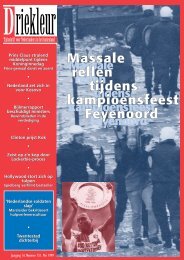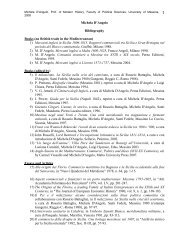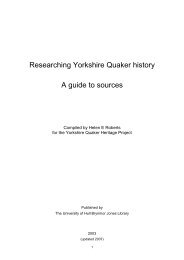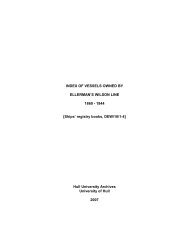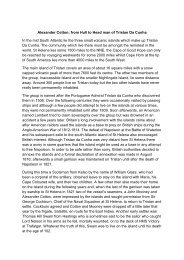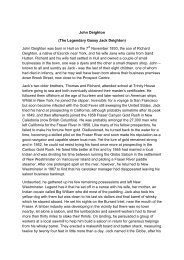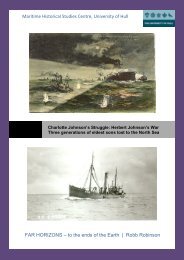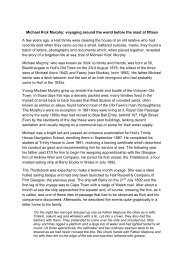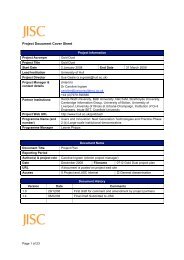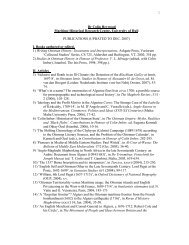The North Atlantic Fisheries, 1100-1976 - University of Hull
The North Atlantic Fisheries, 1100-1976 - University of Hull
The North Atlantic Fisheries, 1100-1976 - University of Hull
You also want an ePaper? Increase the reach of your titles
YUMPU automatically turns print PDFs into web optimized ePapers that Google loves.
season the weather was not favourable and the outcome that year <strong>of</strong> the<br />
fishery was not as positive as the expectations.<br />
Through the 1930s the Faroese had with good reason protested about<br />
conditions in Greenland, for instance the lack <strong>of</strong> modern repair facilities<br />
for ships at Færøhavn, better lighting and the need for a small hospital<br />
there etc. <strong>The</strong> hospital was built in 1937. 165 Anyway, in spite <strong>of</strong> all<br />
obstacles, Table II and III demonstrate how much the opening <strong>of</strong> the<br />
Greenlandic waters meant to the Faroe Nation in the Inter-War Years.<br />
That opening was due to Danish goodwill and understanding <strong>of</strong> the<br />
Faroese problems which <strong>of</strong>ten came into conflict with considerations,<br />
which were just as reasonable, for the welfare <strong>of</strong> the Greenlanders.<br />
In the Second World War, the British occupation <strong>of</strong> the Faroe Islands<br />
and the German occupation <strong>of</strong> Denmark divided the two peoples for five<br />
years. Under great dangers and huge casualties in life and shipment the<br />
Faroese once again fished the nearby banks and sold the catch to Britain.<br />
Nobody in five years thought <strong>of</strong> fishing <strong>of</strong>f Greenland.<br />
Conclusion<br />
In the 15 years between the first Faroese claims to fishing rights <strong>of</strong>f<br />
Greenland and 1939 we have seen an unusual political unanimity on the<br />
matter among the Faroese. Already in 1924 most <strong>of</strong> the major points had<br />
been put forward: (1) there was cod <strong>of</strong>f Greenland, (2) the fishery at<br />
Iceland was diminishing, (3) the Danish-Norwegian Greenland Treaty<br />
provoked Danish subjects (i.e. the Faroese), (4) the Faroese fishing fleet<br />
was outdated, (5) the historical-popular arguments <strong>of</strong> Patursson, (6) the<br />
deterioration <strong>of</strong> the home fishery. To those arguments were added only<br />
two; first, that the world crisis after 1930 really hit the fish industry;<br />
second, that some sort <strong>of</strong> occupation had to be found for the small-boat<br />
fishermen (and that could be obtained from land stations in Greenland).<br />
Political and public opinion in Denmark took the constantly<br />
worsening economic situation <strong>of</strong> the ordinary Faroese families very<br />
councils had to be consulted before a date for the practice <strong>of</strong> the law could be stipulated,<br />
finally it was announced to 1 July, 1939. It became more difficult than anticipated to get<br />
the approval <strong>of</strong> the Greenlandic councils in the spring <strong>of</strong> 1939, but in the end they gave in<br />
to the united pressure <strong>of</strong> the ‘sheriffs’ (Danish chairmen <strong>of</strong> the councils) and Grønlands<br />
Styrelse.<br />
165 Many <strong>of</strong> the calamities and miserable conditions for the Faroese fishermen at<br />
Greenland are dealt with by E. Patursson, Fiskiveiði, 265-293. He does not mention that<br />
the Faroese, against strong Greenland protests, in 1939 achieved what they for many<br />
years had fought for and got it with the broadest possible backing from Denmark.<br />
83



